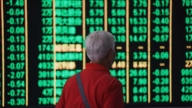【新唐人2014年08月28日訊】日前美國《福布斯》雜誌發文指出,今年以來中國各項經濟指數暴跌,顯示出火爆了近40年的中國經濟,終於崩潰了。而自5月份以來,一直被用來支撐中國地方政府財政的土地拍賣,流拍的現象也頻繁湧現。專家指出,中國實際情況比數據顯示的還要糟糕。
美國《福布斯》雜誌專欄作家章家敦25號發表文章「中國經濟火了40年,終於要崩潰了」。文章中以中共最近發佈的各項經濟數據,詳盡的分析了中國經濟崩潰現象。
例如,7月份,外國直接投資同比下降了17.0%,進口下降1.6%﹔而作為中國最全面借貸指標的社會融資規模,在7月份竟然下降了86.1%,新增貸款也創下2008年10月以來的最低水平,顯現出經濟基本面的整體疲軟態勢。
本來,儘管7月份公布的中國製造業PMI預覽指數51.7,和其他數據有些矛盾,但比起從前年起就一直在48.2 到50上下徘徊,似乎稍微挽回了一些局面。而剛剛公布的8月份中國製造業PMI預覽指數,又下滑到50.3,讓分析師大為震驚。美國《華爾街日報》形容,這一數據,給一些原本指望中國經濟今年「先抑後揚」的經濟學家,澆了一盆冷水,中國經濟面臨一場「攻堅戰」。
清華大學經濟管理學院教授楊斌:「其實國內就是一種經濟危機的狀況,有好多特徵,股市的跌,物價的通貨膨脹,企業的凋敝,人們消費能力的不足,去年或前年就是這種狀況了,只是數據或許統計出來比較晚」。
中國金融智庫研究員鞏勝利曾經指出,對於經濟學家來說,全球其他國家的經濟都可以通過透明的數據來預測,但是對中國而言,如果僅僅通過數據來預測,只能四處碰壁。
2008年,中共依靠大量印製鈔票,向經濟體注入大量現金,躲過了全球經濟衰退的最壞影響,但由於過分投資基礎建設和房地產,造成的資源浪費和錯配,卻無法挽回。
目前,儘管當局宣佈,只會使用「微刺激政策」或「定向措施」,事實上還是在儘可能迅速地向經濟體注入資金。
6月份,金融機構投放了1.08萬億元人民幣的新增貸款,在5月份的基礎上猛增了40.7%,比去年同期增長了14.7%。而這些新增貸款,主要還是流向了國家和地方政府實體。
楊斌:「民營企業成本都百分之好幾十了,銀行只針對國有企業,對民營企業收得緊,沒有優惠政策,企業就沒法活啊,降稅或減稅都不能使民營企業起死回生了。」
清華大學黨委書記,經濟學教授楊斌指出,猶如殭屍般的國營企業,已經成為中國經濟的嚴重拖纍。
大陸經濟學家楊佩昌:「每個人都把住自己的一小塊領域,比如說,你在某個領域改革,它就會問你,你為甚麼不在其他領域改革呢,那你又不可能全面性的改革,在中國這種體制下,全面性的改革可能性是不大的。」
而今年以來,隨著房地產市場的持續下滑,北京、廣州、成都、深圳等一線城市,和多個二三線城市,都頻繁的出現土地流拍現象。
中國經濟評論家牛刀指出,中國房地產崩盤,就是從北京土地流拍開始。而房地產的崩盤將影響到多個上下產業鏈 ,幾乎波及整個經濟領域。
採訪編輯/劉惠 後製/李勇
China Economic Index Plunges, Experts Predict Crash
China’s economic performance has taken a plunge this year
and Forbes magazine says it’s a sign of the end of China’s
four-decade economic cycle.
Land sales, which local governments have heavily relied on
financially, also show signs of staggering.
Experts are saying the real situation is even worse than
what the data shows.
Columnist Gordon Chang contributed an article to Forbes on
Aug. 25, titled, “The End of China’s Four-Decade Economic
Cycle," describing the collapse of China economy
with detailed data analysis.
For example, Chang said, “Foreign direct investment plunged
17.0%; imports fell 1.6%; and total social financing,
China’s most-inclusive measure of lending, dropped 86.1%.
“New credit of 273.1 billion, the lowest since October 2008,
suggested fundamental weakness throughout the economy."
According to Wall Street Journal, “the preliminary HSBC
China Manufacturing Purchasing Managers Index fell to
50.3 in August—a three-month low—compared with a final
reading of 51.7 in July."
“That was below the expectations of economists."
The data has dashed many economists’ hopes that China’s
economy would finish the year strong after a slow start.
“China’s economy faces an uphill battle for the rest of 2014″
added WSJ.
Yang Bin, professor at Tsinghua University School of
Economics and Management: “In fact, the domestic situation
shows economic crisis on many fronts,
such as the stock market drop, inflation, depressed industry,
and low consumption capacity.
It has been like this since two years ago. The data came late."
Chinese financial think-tank researcher Gong Shengli once
said that for economists, prediction is normally done
using transparent data.
But in China, data based predictions can only be troublesome.
In 2008, the CCP flooded the economy with cash
to avoid the worst effects of the global downturn.
But excessive investment in infrastructure and real estate
has resulted in irresolvable waste and misuse of resources.
The regime claims to only use “micro-stimulus" or “targeted
measures," but behind-the-scenes, is pouring cash into China
as fast as possible, according to Forbes.
In June, they issued 1.08 trillion yuan in new loans.
Total social financing rose 40.7 percent since May,
while the amount of money in circulation (M2)
rose 14.7 percent since last year.
Chang says, “From all indications, the June loans largely
went to state and local government entities."
Yang Bin: “Bank loans only target state-owned enterprises,
even though private enterprises have higher operational costs.
Without preferential policy,
even tax cuts can’t save the private enterprises."
Yang Bin says that the zombie-like state-owned enterprises
have become a serious drag on the economy.
Yang Peichang, economist: “Everyone is holding onto his area.
If the reform is conducted in one area,
they will question, what about other areas?
There is just no way to conduct comprehensive reforms
in China.
Under such a regime, there is little likelihood
of any comprehensive reform."
The decline in the real estate market has taken place in first
tier cities such as Beijing, Guangzhou, Chengdu, and Shenzhen.
Staggering land sales have also appeared
in a number of second and third tier cities.
China economic critic Niu Dao says that China’s real estate
crash began with the drop in Beijing’s land sales.
The effects of the real estate collapse will be felt
in many upstream and downstream chains of the industry,
and nearly all throughout the entire economic world.
Interview & Edit/LiuHui Post-Production/LiYong



























